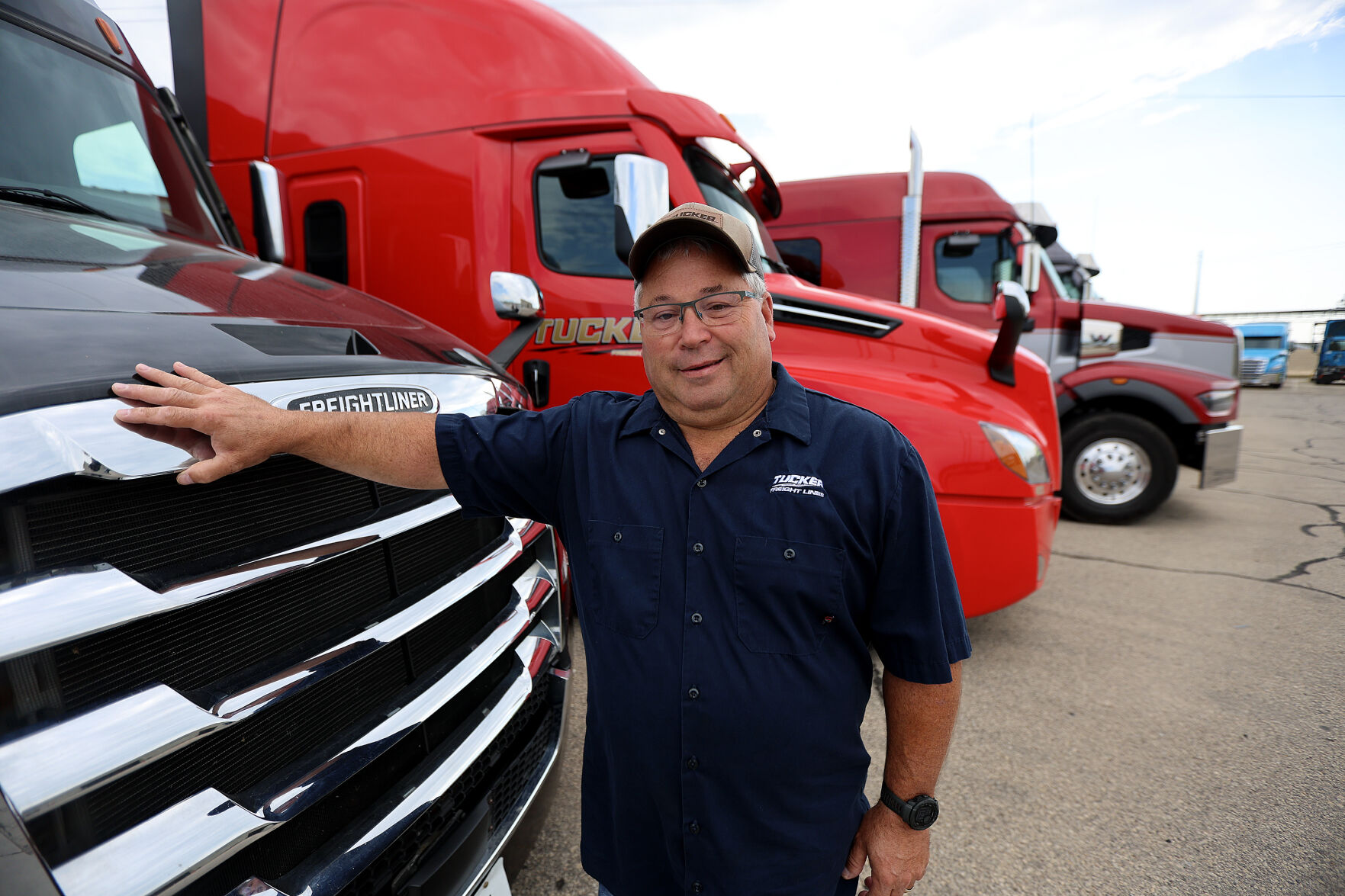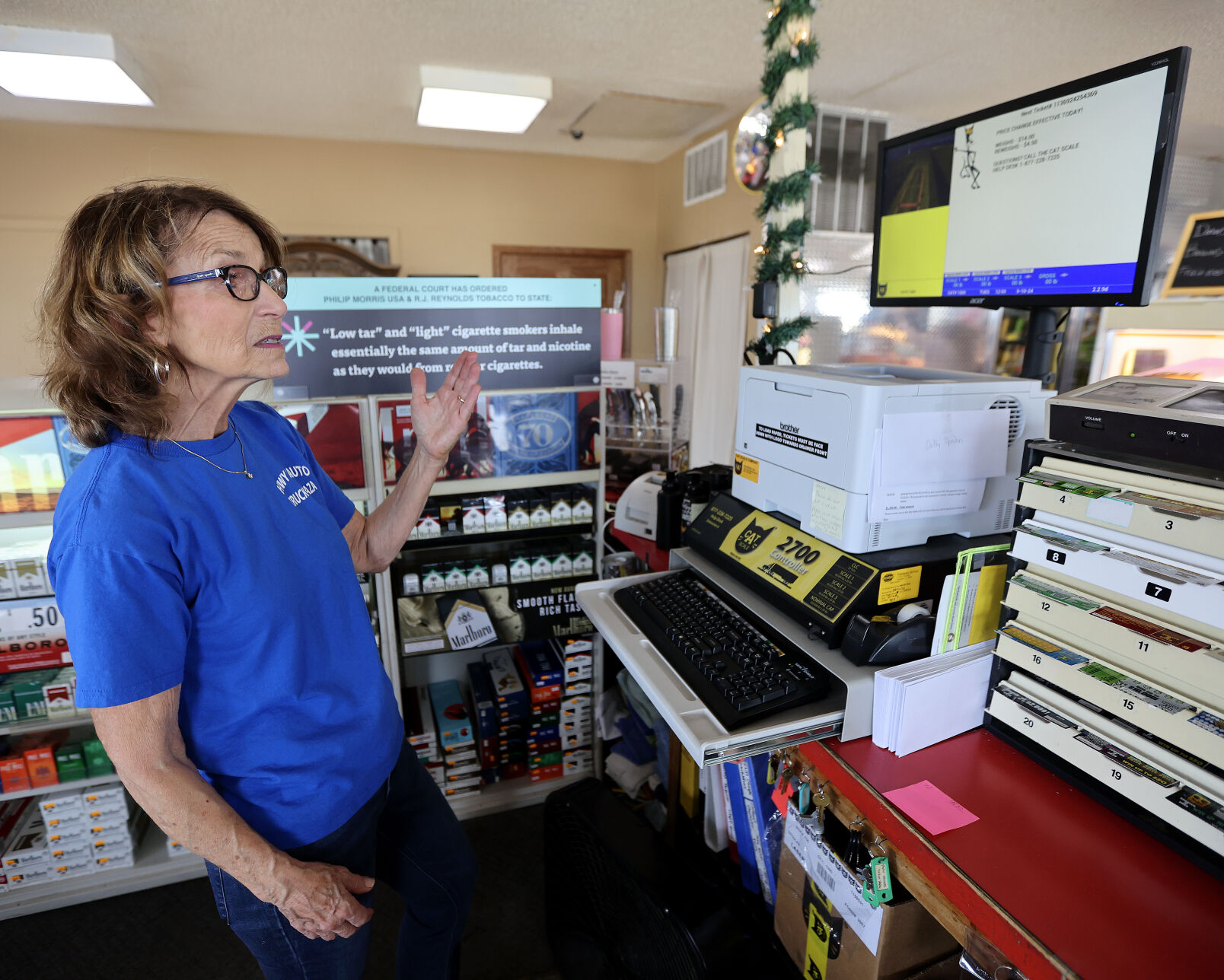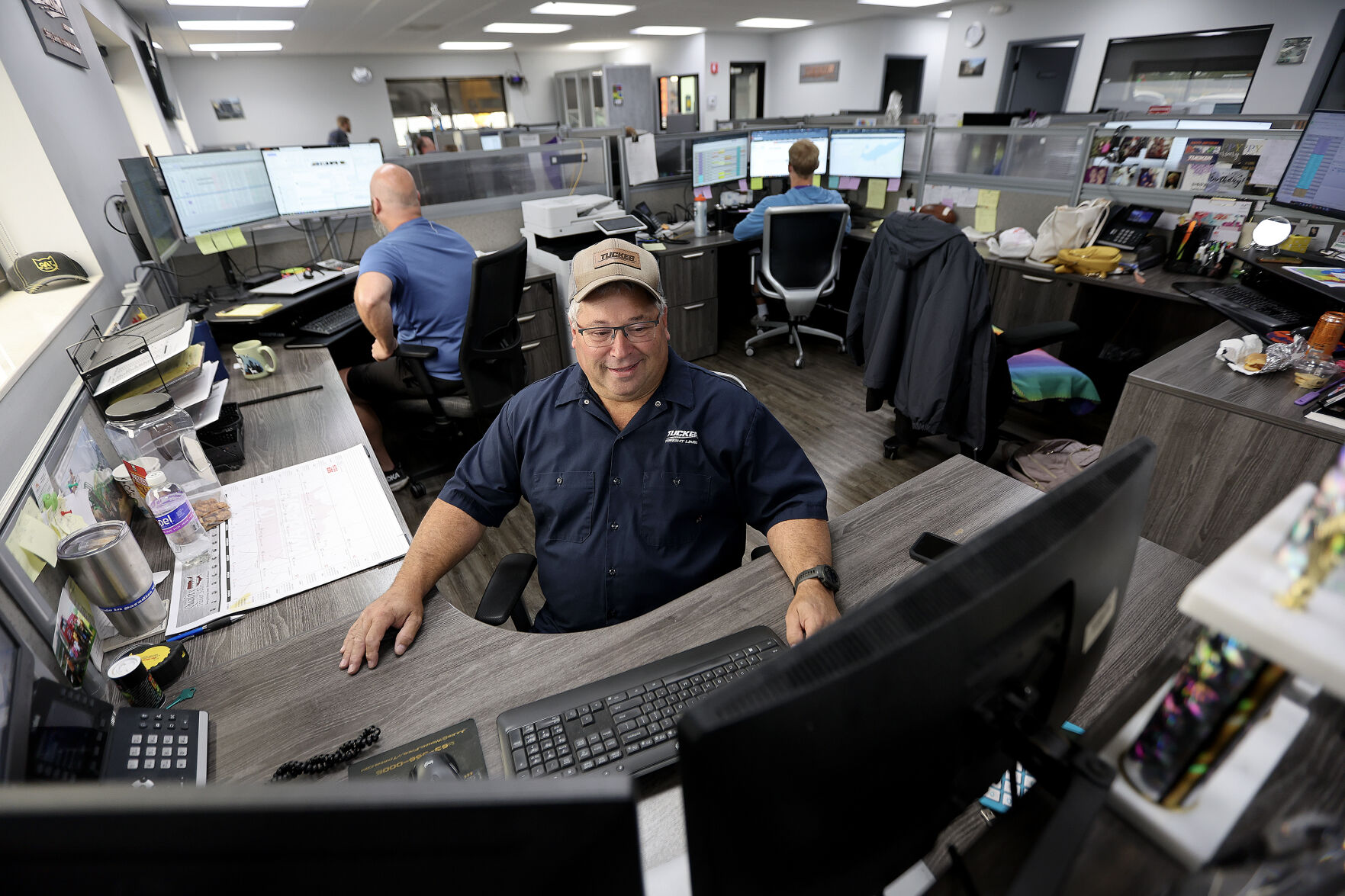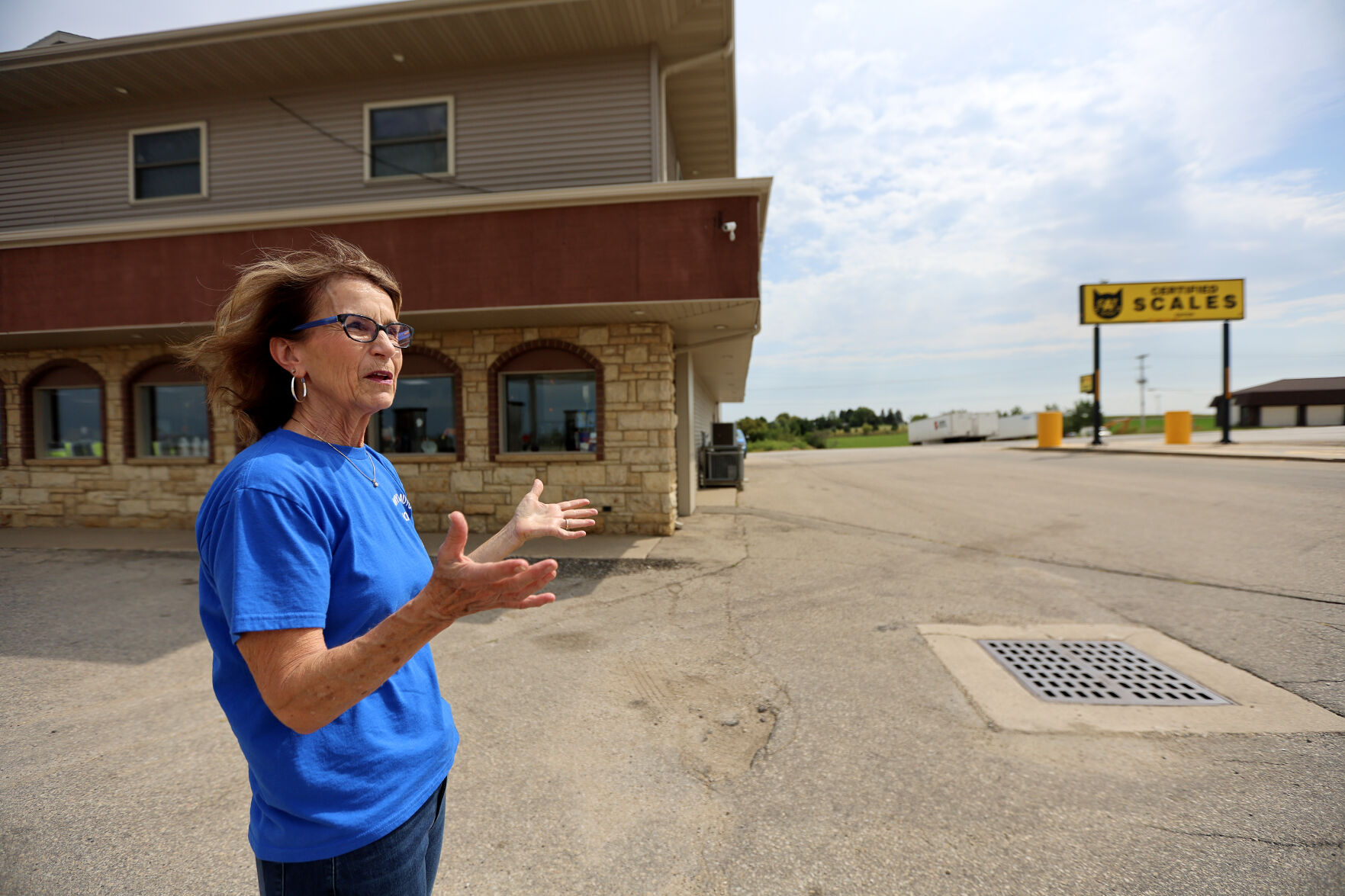During almost four decades as a trucker, Bob Schmitt got used to driving loaded 18-wheelers down highways across North America.
“I started when I was 18 years old with my dad,” said the Sherill, Iowa, native, now 59. “I’ve been an owner-operator since 2001. I was over the road almost all that time … I hauled a lot of John Deere equipment up to the port in Maryland. I made 38 trips to Baltimore in 2019.”
There are roughly 37,500 heavy and tractor-trailer drivers in Iowa, according to 2023 data from the Bureau of Labor Statistics. Iowa is ranked fourth in the U.S. for having the highest concentration of commercial truck drivers, and there are about 2 million nationwide. At the heart of the trade is solitude, sacrifice and patience.
Away from his family during the week, Schmitt’s big rig became a home away from home during long-hauls. He slept in the semi-tractor trailer, which featured a bed, microwave and TV. On weekends, he returned to his wife, Nancy, and three children.
“When he would come home on the weekends, I didn’t have to cook,” said Nancy Schmitt. “When he was gone, we talked at least two times a day.”
As the wife of an over-the-road trucker, Nancy Schmitt, who also works, took care of matters at home. Being apart for long periods was tough, but their marriage has lasted 28 years.
“I think you have to know what you’re signing up for,” said Nancy Schmitt. “We always worked really hard to do things with just the two of us (when he was home) … You need to have the hard conversations so you’re on the same page.”
Other than staying in touch by phone frequently, the family also maintained their bond in other ways. Each summer, for example, Bob Schmitt would take one of the kids with him on a long haul. On the weekends, Nancy would sometimes take part in tractor pulls, one of her husband’s hobbies.
“In the 19 years I was an owner-operator, I drove two million miles without an accident,” reflected Bob Schmitt proudly.
Schmitt used to transport cargo for Tucker Freight Lines as an independent driver, beginning when the company was known by a previous name — Art Pape Transfer. AJ Tucker took over about six years ago. For the past five years, Schmitt has been a dispatcher for the Dubuque-based firm.
Because of the demands of the job coupled with retirements, there has been a shortage of drivers in recent years, according to the American Trucking Association. One way this deficit is being addressed is by the addition of more foreign-born drivers. According to BLS data from 2020, about 18.6% of long haul and heavy truck drivers are immigrants.
“When working with truck drivers, you need to be able to work with every sort of personality,” said Andy Kemp, fleet manager and dispatcher for All Seasons Trucking, who also drives part-time. “You also need to be able to put yourself in their shoes and know what they are going through … I feel it’s important that my drivers know that I have driven a truck and am not afraid to jump in when my office work is done at night or on the weekends.”
For Kemp, trucking is “in his blood.” The Dubuque operation he works for was founded by his father and grandfather in 1992.
“There are countless challenges in our industry,” said Kemp. “One of the major ones that I notice … and hear about is other distracted drivers. Sitting in a semi gives us a bird’s-eye view, and cellphones are a major factor, especially with — but not limited to — the younger population.”
Kemp emphasized that the public should give trucks room and patience on the road.
“Just last week I had a person call me from out of town and they were upset that our driver blew the air horn,” he said. “Then proceeded to tell me that they were approaching the construction zone after coming across the (Wisconsin) bridge into Dubuque. Their lane closed and they weren’t paying attention and had to speed up to get in front of the truck … (I) asked them if it occurred to them that they basically cut him off instead of slowing down and merging over. … Unfortunately, that’s the entitled, selfish behavior that (truck) drivers deal with on a daily basis. I pulled the dash cam footage, and it was scary. Luckily our driver was prepared and hit the brakes in time.”
Tom Fitzgerald, a Dubuque-based short haul tanker-truck driver, echoed Kemp’s warning, saying “eight out of every 10 drivers” he sees on the road are using phones.
On a recent day while filling up fuel tanks at the BP Auto/Truck Plaza on East 16th St., the Rainbo Oil Co. employee reflected on his 30-year career. Transporting fuel adds an extra element of danger to Fitzgerald’s work.
“There’s not a lot of room for error in what I do,” he said. “I didn’t go to college, (but) it pays well. I have to be hazmat certified every four years.”
The gas station is important for truckers because it has a CAT scale. This large machine gives truckers an official weight for their rig, which they must show to regulators if asked to stop at a weigh station.
Truckers can generally drive up to 11 hours a day. A key local rest stop is Highway 20 Truck and Auto Plaza, located just outside of Dubuque. Ron White and his wife, Margie, are co-owners.
“There’s room for 50 trucks per night,” said Ron White. “That’s our capacity … My wife is the hands-on manager.”
White describes himself as a born-again Christian who sees the operation as a chance to reach out to souls in need.
“I have Good News Bible Ministry,” said White. “I’m trying to build a place of refuge as times get tougher here.”
Many mornings, truckers exiting nearby Klockner Metals use the plaza’s CAT scale to weigh their loads.
“There are times when (drivers) miss their families,” Margie White said. “I think the long-haul truckers … are used to it. It’s a hard life. Waiting to load or unload (is difficult for them). Anytime they’re sitting there, they’re losing money … I really enjoy helping them.”





